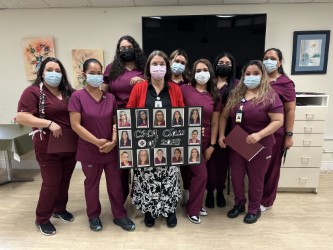A Brief Overview of PTSD
- Category: Health & Wellness, Behavioral Health
- Posted On:
- Written By: Lompoc Valley Medical Center

PTSD is a result of accumulated lifetime stress or a singular triggering event such as experiencing or witnessing something that shocks the moral consciousness. Only a small portion of people who are exposed to a traumatic event develop Posttraumatic Stress Disorder (PTSD).
“Approximately 33% of service members who return from combat suffer from at least one of these conditions, and 5% meet the criteria for all three diagnoses.” (Ohye et al., 2014) That’s 3 of 10 veterans returning home. Post-Traumatic Stress Disorder is an anxiety disorder. It has three different categories of Symptoms: Intrusive, Avoidance and Hyperarousal.
- Intrusive Thoughts
- Distressing Recollections
- Flashbacks- feeling like your back in a combat while awake. This could be different for everyone. It could be a random smell that brings you back the combat zone. It could be a sound that brings you back emotionally to your time in a combat zone.
- Nightmares- these are intrusive and unpredictable. They range from feeling helpless to feeling sorrow and to the extreme you could wake up and feel like the enemy is sleeping next to you.
- Feeling Anxious and Fearful- this is similar to having flashbacks, it is like having false intuition like something is about to occur and you are not prepared.
- Avoidance
- Extensive and Active Avoidance- this is a standout common symptom. There is a running cliché that some veterans don’t like to talk about the war. This is a sign of possible Post-Traumatic Stress Disorder. But it goes beyond just avoiding the conversation of war. It could be a loss of memory and surrounding combat experience. Some have forgotten the names of people they served within the most intimate of environments, combat.
- Loss of Interest- Things that interest you in the past no longer seem important.
- Feeling Detached from Others- This is a symptom that is also common. I would compare it to feeling like you have nothing in common with people. The feeling comes from the intimate attachment to your combat experience and not feeling like you could relate to anyone.
- Restricting your Emotions- Simply put your limiting your emotional involvement to an otherwise personal matter.
- Trouble Remembering- Victims often have trouble remembering what lead to the injury and some create false memories.
- Shutting down- this is similar to Feeling Detached, but it could also imply a physiological effect of numbness.
- Hyper-Arousal
- Difficulty Sleeping- This is different for everyone. Some might say that their mind is racing and can’t sleep. Some find comfort in falling asleep after everyone in their family is sleeping as to not be woken up by others and potentially causing a flashback.
- Irritability/Outburst/Anger- Short temper is very common. An emotional filter is lost for some and they fail to judge the appropriateness of their response to a difficult situation.
- Difficulty Concentration
- An Exaggerated Startle Response- Things that would remind you of the combat zone.
- Hyper Vigilance- this is best described as feeling like you have to defend yourself. Feeling like danger is a foot and you need to be cautious of impending injury.
(American Psychiatric Association, 2013)
Combat Related Triggers
- Specific Scenes- this could be anything that could possibly remind you of anything related to your traumatic event.
- Movement- this could be anyone following closely behind or walking and or running directly towards you.
- Sounds- Gun shots, helicopters, screams, whimpers, the sound of a weapon being put into the battery.
- Smell- this is specific to the environment or combat theater you might have been in. For example, a Vietnam Veteran might be sensitive to rain or the smell of the jungle. Whereas an Iraq Veteran might be sensitive to the smell of wet sand and the dry heat of the desert.
- Touch- some might get a trigger from touching gunmetal, bullets, and camouflage net or military fatigues.
- Situational- being in an overcrowded place might trigger an anxiety attack.
Reference
American Psychiatric Association. (2013). Diagnostic and statistical manual of mental disorders (5th ed.).Washington, DC: Author.
Ohye, B. Y., Brendel, R. W., Fredman, S. J., Bui, E., Rauch, P. K., Allard, M. D., et al. (2014). Three-generation model: A family systems framework for the assessment and treatment of veterans with posttraumatic stress disorder and related conditions. Professional Psychology: Research and Practice. ISSN 0735-7028.






